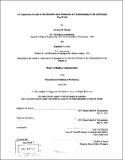| dc.contributor.advisor | John Van Maanen. | en_US |
| dc.contributor.author | Boggie, Gordon M. (Gordon Mathieson), 1957- | en_US |
| dc.contributor.author | Keys, Elizabeth A. 1969- | en_US |
| dc.contributor.other | Sloan School of Management. | en_US |
| dc.date.accessioned | 2005-08-23T20:28:30Z | |
| dc.date.available | 2005-08-23T20:28:30Z | |
| dc.date.copyright | 2002 | en_US |
| dc.date.issued | 2002 | en_US |
| dc.identifier.uri | http://hdl.handle.net/1721.1/8476 | |
| dc.description | Thesis (M.B.A.)--Massachusetts Institute of Technology, Sloan School of Management, 2002. | en_US |
| dc.description | Includes bibliographical references (leaves 63-66). | en_US |
| dc.description.abstract | Hydrogen Fuel Cells are a much talked about technology often represented as promising virtually unlimited amounts of non-polluting power by chemically reacting hydrogen, the most abundant element in the universe, with oxygen without combustion. Our analysis indicates that fuel cells are indeed a promising technology still under development. Our analysis concludes that there are considerable problems to overcome before a widespread transition to hydrogen fuel cells occurs, including cost, infrastructure, performance and most importantly generation of the hydrogen fuel itself. The infrastructure and hydrogen generation hurdles are extremely large, enough to require significant government intervention before renewable hydrogen resources displace fossil fuels. We believe the transition to renewable hydrogen fuel sources, and fuel cells are inevitable given the diminishing, non-renewable fossil fuel reserves. We further believe that we are rapidly approaching the date required to make fundamental energy policy changes to enable a hydrogen economy. Disappointingly, there is little evidence that U.S. government is prepared to make this decision in a timely manner. | en_US |
| dc.description.statementofresponsibility | by Gordon M. Boggie and Elizabeth A. Keys. | en_US |
| dc.format.extent | 66 leaves | en_US |
| dc.format.extent | 5810922 bytes | |
| dc.format.extent | 5810681 bytes | |
| dc.format.mimetype | application/pdf | |
| dc.format.mimetype | application/pdf | |
| dc.language.iso | eng | en_US |
| dc.publisher | Massachusetts Institute of Technology | en_US |
| dc.rights | M.I.T. theses are protected by copyright. They may be viewed from this source for any purpose, but reproduction or distribution in any format is prohibited without written permission. See provided URL for inquiries about permission. | en_US |
| dc.rights.uri | http://dspace.mit.edu/handle/1721.1/7582 | |
| dc.subject | Sloan School of Management. | en_US |
| dc.title | A consumer guide to the benefits and obstacles of transitioning to the hydrogen fuel cell | en_US |
| dc.type | Thesis | en_US |
| dc.description.degree | M.B.A. | en_US |
| dc.contributor.department | Sloan School of Management | |
| dc.identifier.oclc | 50717955 | en_US |
